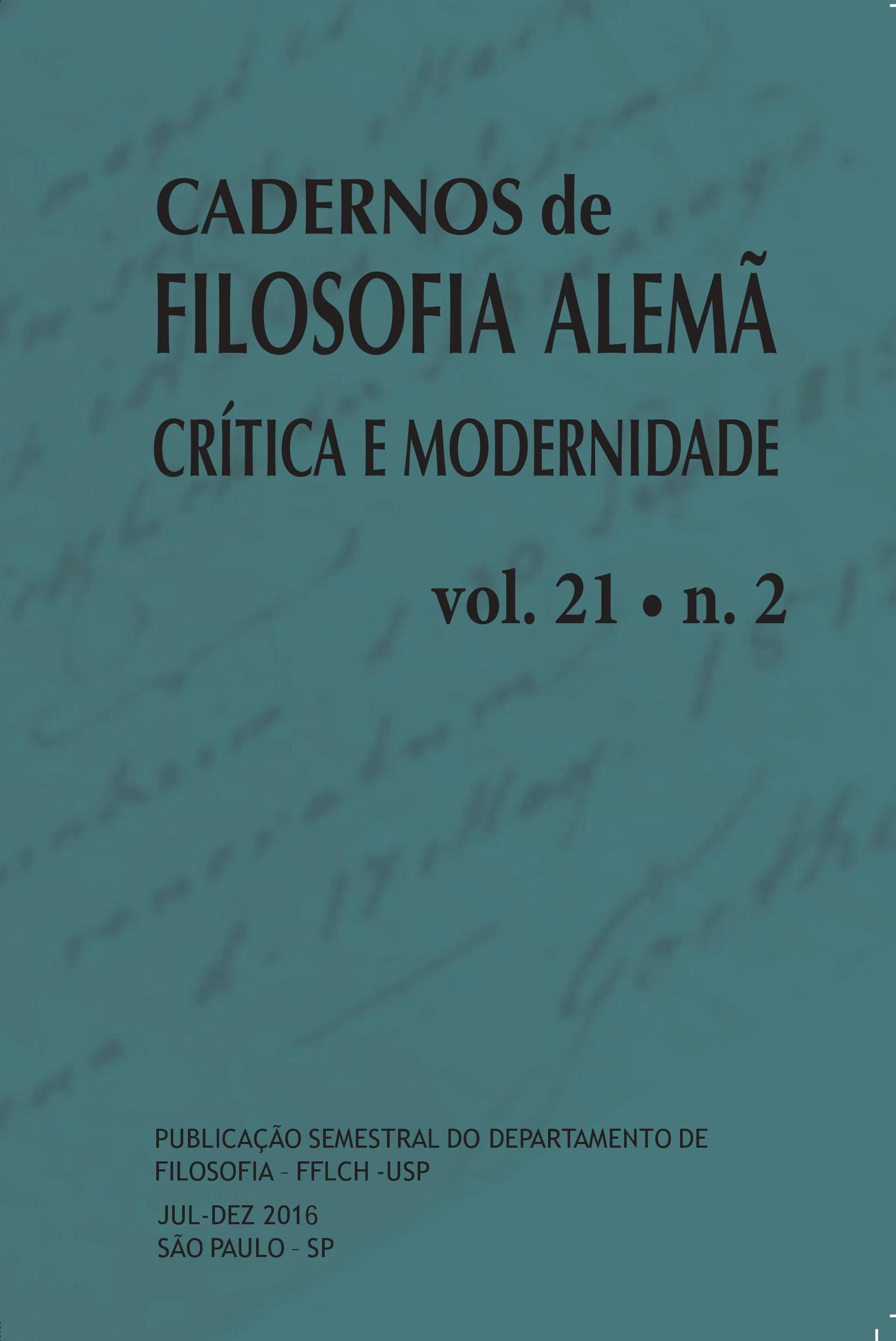Necessary, but not sufficient: on the role of the critique of economy in Theodor W. Adorno’s late critical theory
DOI:
https://doi.org/10.11606/issn.2318-9800.v21i2p13-29Keywords:
Theodor W. Adorno, critical theory, late capitalism, critique of reason.Abstract
Many different interpreters of Theodor W. Adorno's work suggest that the critique of instrumental rationality has replaced the critique of capitalism in the development of his work, mainly because of the adoption of the diagnosis about the emergence of state capitalism, which was proposed by Friedrich Pollock. In this paper, I question the acceptance by Adorno, at least in his later work, of such diagnosis and show that the critique of capitalism was not replaced by the critique of reason, but complemented by it.Downloads
References
Adorno, T. (1974). Philosophische Terminologie (Band II). Frankfurt am Main: Suhrkamp Verlag.
___________. (1986). Ästhetische Theorie. Frankfurt am Main: Suhrkamp Verlag.
___________. (1986a). “Capitalismo tardio ou sociedade industrial?”. In: Gabriel Cohn (org.). Theodor W. Adorno: sociologia. São Paulo: Ática.
___________. (1986b). “Gesellschaft”. In: Gesammelte Schriften 10/2. Frankfurt am Main: Suhrkamp Verlag.
___________. (1992). Minima moralia. Tradução de Luiz Eduardo Bicca. Revisão de Guido de Almeida. São Paulo: Ática.
___________. (1997). “Das Schema der Massenkultur”. In: Gesammelte Schriften 3. Frankfurt am Main: Suhrkamp Verlag.
___________. (1998). Prismas. Tradução de A. Wernet e J. M. B. de Almeida. São Paulo: Ática.
___________. (2003). Vorlesung über Negative Dialektik. Frankfurt am Main: Suhrkamp Verlag.
___________. (2008). Introdução à sociologia. Tradução de W. Leo Maar. São Paulo: Unesp.
___________. (2008a). Philosophische Elementer einer Theorie der Gesellschaft. Frankfurt am Main: Suhrkamp Verlag.
___________. (2009). Dialética negativa. Tradução de M. A. Casanova. Revisão de E. S. Neves Silva. Rio de Janeiro: Zahar.
Adorno, T. W. e Horkheimer, M. (1985). Dialética do esclarecimento. Tradução de Guido de Almeida. Rio de Janeiro: Zahar.
_____. (2003). Briefwechsel (Band 4.II 1938-1944). Frankfurt am Main: Suhrkamp Verlag.
Benhabib, S. (1986). Critique, Norm, Utopia. New York: Columbia University Press.
Benzer, M. (2011). The Sociology of Theodor Adorno. Cambridge: Cambridge University Press.
Berendzen, J.C. (2013). “Max Horkheimer”. In: E. Zalta (ed.). The Stanford Encyclopedia of Philosophy (Fall 2013 Edition), URL = <http://plato.stanford.edu/archives/fall2013/entries/horkheimer/>. Acesso em 14 out. 2016.
Bohman, J. (2013). “Critical Theory”. In: E. Zalta. (ed.). The Stanford Encyclopedia of Philosophy (Spring 2013 Edition), URL = <http://plato.stanford.edu/archives/spr2013/entries/critical-theory/>. Acesso em 14 out. 2016.
Bukharin, N. (1972). Imperialism and World Economy. London: Martin Lawrence.
Cohn, G. (1986). “Introdução: Adorno e a teoria crítica da sociedade”. In: Gabriel Cohn (org.). Theodor W. Adorno: sociologia. São Paulo: Ática.
Cook, D. (2004). Adorno, Habermas and the search of a rational society. Londres: Routledge.
Dews, P. (1996). “Adorno, pós-estruturalismo e a crítica da identidade”. In: Slavoj Zizek (org.). Um Mapa da ideologia. Rio de Janeiro: Contraponto.
Dubiel, H. (1985). Theory and Politics. Cambridge: MIT Press.
Freyenhagen, F. (2013). Adorno’s Practical Philosophy: Living Less Wrongly. Cambridge: Cambridge University Press.
Habermas, J. (2012). Teoria do agir comunicativo. Tradução de P. A. Soethe e F. B. Siebeneichler. São Paulo: Martins Fontes.
Hammer, E. (2006). Adorno and the Political. Londres: Routledge.
Honneth, A. (1993). The Critique of power: reflective stages in a critical social theory. Cambridge: MIT Press.
Horkheimer, M. (1975). “Teoria tradicional e teoria crítica”. In: Benjamin, W., Adorno, T., Horkheimer, M., e Habermas, J. Textos escolhidos. São Paulo: Abril Cultural.
___________. (1985). “The Authoritarian State”. In: A. Arato e E. Gebhardt (ed.). The Essential Frankfurt School Reader. New York: Continuum.
___________. (1988). “Nachtrag”. In: Gesammelte Schriften, Band 4. Frankfurt am Main: S. Fischer Verlage.
Jay, M. (1988). As idéias de Adorno. Tradução de Adail Sobral. São Paulo: Cultrix, EDUSP.
___________. (2008). A Imaginação dialética. Tradução de Vera Ribeiro. Rio de Janeiro: Contraponto.
Kellner, D. (1975). The Frankfurt School Revisited: A Critique of Martin Jay’s The Dialectical Imagination. New German Critique, 4, pp.131-152.
Marramao, G. (1975). Political Economy and Critical Theory. Telos, 24, pp.56-80.
Neumann, F. (2009). Behemoth. Chicago: Ivan R. Dee.
Nobre, M. (1998). A Dialética negativa de Theodor W. Adorno: a ontologia do Estado falso. São Paulo: Iluminuras.
Nobre, M. e Marin, I. (2012). Uma nova antropologia, unidade crítica e arranjo interdisciplinar na Dialética do esclarecimento.Cadernos de Filosofia Alemã, 20, pp.101-122.
Pedroso, G. (2009). Entre o capitalismo de Estado e o Behemoth: o Instituto de Pesquisa Social e o fenômeno do fascismo. Cadernos de Ética e Filosofia Política,15, pp.151-179.
___________. (2013). “Capitalismo de Estado ou Capitalismo Tardio”. In: M. Carvalho e V. Figueiredo (orgs.) Filosofia alemã: de Marx a Nietzsche. São Paulo: ANPOF.
Pollock, F. (1941). State Capitalism. Studies in Philosophy and Social Science, IX(2), pp.200-25.
Postone, M. (2003). Time, Labor and Social Domination: A reinterpretation of Marx’s critical theory. Cambridge: Cambridge University Press.
Ramos, D. (2012). Franz Neumann e o nazismo como destruição do Estado. Ethic@, 11(3), pp.299-327.
Wiggershaus, R. (1995). The Frankfurt School: its history, theories, and political significance. Cambridge, MA: MIT Press.
Zuidervaart, L. (2011). “Theodor W. Adorno”. In: E. Zalta (ed.). The Stanford Encyclopedia of Philosophy (Winter 2011 Edition), URL = <http://plato.stanford.edu/archives/win2011/entries/adorno/>. Acesso em 14 out. 2016.
Downloads
Published
Issue
Section
License
Information and conceptions on the texts are complete responsibility of the authors.
All the articles submitted before July 5th 2018 and those published after July 2021 are licensed under a CC BY-NC-ND license – except those published between the aforementioned dates, which are under the CC BY-NC-SA license. The permission for the translation of the material published under the license CC BY-NC-ND by third parts can be obtained with the consent of the author.
Open access policies - Diadorim
Rules applied before July 5th 2018:
Presenting a submission to our Editorial Board implies granting priority of publication for “Cadernos de filosofia alemã”, as well as transferring the copyright of texts (once published), which will be reproduced only with the manifest authorization of the editors. Authors keep the right to reuse the texts published in future editions of their work, without paying any fees to "Cadernos”. We will not grant the permission to re-edit or translate the texts for third parts without agreement of the author.


